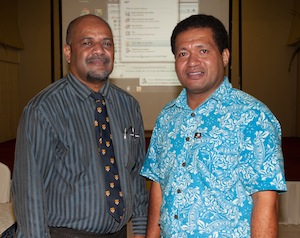
The Director of Fiji’s Mineral Resources Department, Mr. Malakai Finau told participants in a one day Fiji National Deep Sea Mineral Consultation Workshop held in Suva recently that “with deep sea mineral exploration being granted within the Fiji waters it is important to proceed with caution, to strike a balance between economic development and the protection of the environment.”
The workshop is part of in-country stakeholder consultation process organized by SOPAC Division of the Secretariat of the Pacific Community (SPC) through the European Union funded Deep Sea Mineral Project in fifteen Pacific ACP States. This consultation allows government officials as well as representatives of the private sector, academic institutions and civil society groups to explore issues relating to deep seabed minerals and mining.
Similar meetings have already been held in Kiribati, Nauru, Tonga, Samoa and now Fiji. According to SPC-EU Deep Sea Mineral Project Team Leader, Akuila Tawake, there will be a further ten countries where the consultation workshops will be held in the next five months.
Mr. Finau said the Fiji government is in the process of granting exploration licences to two companies, Korea Ocean Resources and Development Institute (KORDI) of Korea, and Canadian Nautulis Minerals Inc. A third, Australian based Bluewater Metals’ application is currently being processed.
He said that Fiji’s mining law is inadequate and needs to be amended to cover all mining issues including deep sea exploration and mining. With environmental issues and concerns identified in this workshop in anticipation of deep-sea mining interest in the country, the review of the mining law is necessary.
Speaking at the workshop, the Director of the SOPAC Division of the SPC, Dr. Russell Howorth, said that he endorsed Mr. Finau’s comments and “that with limited knowledge on deep sea ecosystems and environments derived from the ongoing studies in the last four decades, prudent decisions are necessary to ensure environmental impacts of deep sea mineral exploration and exploitation are minimised or avoided.
“ To this end, the application of the precautionary approach is crucial in ensuring this new industry addresses environmental issues appropriately,” he said.
The SPC-EU Deep Sea Minerals Project was designed at the request of the Pacific ACP States, to have a multi-country regional cooperation, encouraging a multi-stakeholder consultative and participatory approach in the governance and management of deep-sea minerals in the region.
“While deep sea minerals may present an alternative economic sector for development for countries in the region, much of the current commercial entity interests are to explore and evaluate the seabed mineral potential. Deep sea mineral exploration can take many years and any decision to mine or not to mine hinges on the results of extensive mineral exploration, environmental studies, and financial capabilities”.
“We must be careful that we do not create unnecessary fear on the one hand, and false hope on the other, in the minds of the general public”. Dr. Howorth concluded.
CAPTION: (l-r) Director of Fiji’s Mineral Resources Department, Mr. Malakai Finau and SPC-EU Deep Sea Mineral Project Team Leader, Akuila Tawake.





